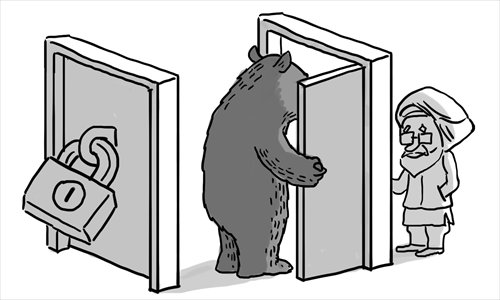Productive visit enhances Delhi-Moscow ties

Illustration: Liu Rui/GT
The meeting between Russian President Vladimir Putin and Indian Prime Minister Narendra Modi in New Delhi on December 10-11 aimed to give a fresh impetus to a bilateral relationship that previously peaked during the Cold War. Increased isolation from the West, coupled with a struggling ruble, has Russia looking for new friends and renewing old relationships.
In many ways, India is a natural partner: Russia is one of the world's largest exporters of arms and oil, and India is one of the world's largest importers. While India aims to diversify its sources of energy and arms, Russia seeks to aid its struggling economy.
India's reception of Putin reveals the degree of pragmatism and realism that has characterized Indian foreign policy under Modi. Since Modi assumed power in May 2014, he has undertaken important foreign visits in order to resurrect India's economy. His trips to Rio de Janeiro, New York and Tokyo were aimed primarily at putting India on the map as an investor-friendly destination rather than projecting India as a foreign policy leader. Modi understands that attracting foreign direct investment in sectors such as manufacturing, construction, telecommunications and financial services to boost India's economic progress and achieve growth is a top priority.
Putin's visit to India resulted in the signing of the following deals: Russia's state-owned Rosatom agreed to build 12 nuclear reactors in India, its state-owned energy company Rosneft inked a deal to ship around 10 million tons of crude oil over the next decade, and Russia also agreed to manufacture advanced multi-use military helicopters in India. These goodies help Russia demonstrate to its Western counterparts that it has influential friends in other parts of the world. Gravitating toward South Asia also helps Russia alleviate the impact of the West-imposed sanctions. In a sign of defiance to the West, the Russian delegation to India included the Russia-backed leader of Crimea, Sergey Aksyonov, who is under sanctions imposed by the US and the EU.
Russia and India have had a close relationship historically. During the Cold War, India leaned toward the Soviet Union while the US courted Pakistan. However, the two nations have drifted apart following the end of the Cold War. Russia has been unhappy over India's increasing reliance on US, Israeli and European defense acquisitions rather than Moscow's defense exports. India, meanwhile, has watched Russia's gas pipeline deals with China and its recent lifting of an arms embargo against Pakistan with great concern.
Putin's India visit sought to underline that the Russia-India relationship is strong and that Russia can continue business as usual in other parts of the world regardless of Western sanctions. Consciously or unconsciously, it also signals an effort on the part of India to dissuade Russia from growing closer to Pakistan.
More importantly, it is also part of India's strategy to signal to its Western allies that India's foreign policy choices cannot be dictated by any single alliance. Instead, India's policies are based on pragmatism and are economically driven. The bottom line here is that India knows very well that it can leverage its geographical and strategic position vis-à-vis China, Russia and the US, and that is exactly what Modi is doing.
The author is the deputy director of the South Asia Center, Atlantic Council. opinion@globaltimes.com.cn